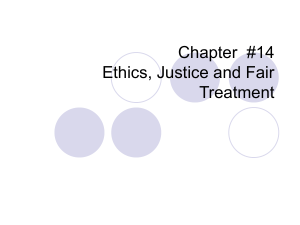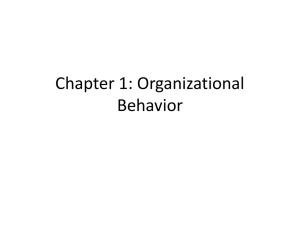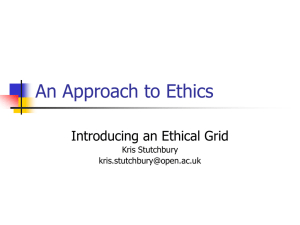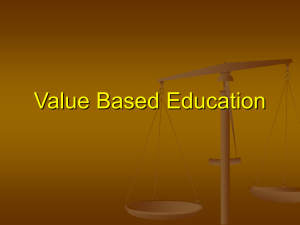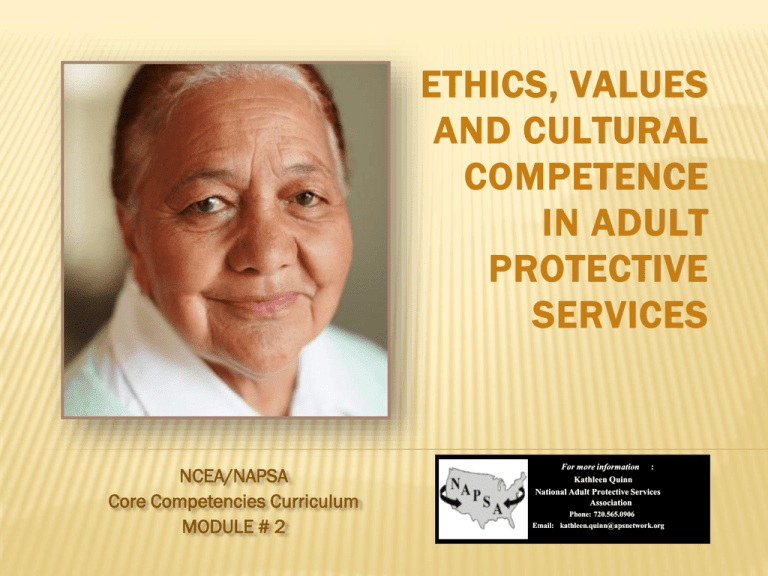
ETHICS, VALUES
AND CULTURAL
COMPETENCE
IN ADULT
PROTECTIVE
SERVICES
NCEA/NAPSA
Core Competencies Curriculum
MODULE # 2
For more information :
Kathleen Quinn
National Adult Protective Services
Association
Phone: 720.565.0906
Email: kathleen.quinn@apsnetwork.org
Address: National Center on Elder Abuse
c/o Center for Community
Research and Services
University of Delaware
297 Graham Hall
Newark, DE 19716
Phone: 302-831-3525
Fax:
302-831-4225
Email:
NCEA-info@aoa.hhs.gov
Web Site: www.ncea.aoa.gov
The National Center on Elder Abuse is funded by the
U.S. Administration on Aging Grant No. 90-AM--2792
This training is a product of the National Center on
Elder Abuse (NCEA), which is funded in part by the
U.S. Administration on Aging under Grant # 90-AM2792. The project was developed by the National
Adult Protective Services Association (NAPSA), and its
contractor, the REFT Institute, Inc.
Grantees undertaking projects under
government sponsorship are encouraged to
express freely their findings and
conclusions. Therefore, points of view or
opinions do not necessarily represent official
Administration on Aging policy.
NAPSA 2006
NATIONAL ADULT PROTECTIVE
SERVICES ASSOCIATION
NAPSA is the only national organization which
represents APS professionals, programs and
clients
NAPSA is the National Voice of APS
NAPSA is a partner in the National Center on
Elder Abuse
NAPSA has members in 49 states and DC
HOUSEKEEPING AND INTRODUCTIONS
Schedule
for the day
CEU instructions
Location of restrooms
Set cell phones to vibrate
Introductions
5
DEVELOPING AN ID CODE
What are the first three letters of your mother’s
maiden name? Alice Smith
What are the first three letters of your mother’s First
name? Alice Smith
What are the numerals for the DAY you were born?
Nov
th
29
Trainee ID Code
S M I
A L
I
2 9
6
EVALUATION PROCESS
Transfer of
Learning Activity
Satisfaction
Survey
Embedded
Evaluation
7
APS CORE COMPETENCIES
There are twenty-three modules in
the Adult Protective Services
(APS) Core Competencies
identified by NAPSA.
This module, Ethics, Values and
Cultural Competence in Adult
Protective Services, is #2.
ETHICS AND VALUES IN APS PRACTICE
TRAINING GOALS
Provide a culturally
competent ethical decisionmaking framework.
Increase ethical selfknowledge.
Increase knowledge and use
of ethical multiculturalism
principles.
LEARNING OBJECTIVES
Define 7 ethical concepts
in APS work.
Describe 5 population
changes that influence
work with vulnerable
adults.
List 4 major influences
on APS decision-making.
LEARNING OBJECTIVES
Describe the cultural
competence continuum.
Provide an example of using
ethical multiculturalism
principles.
List 5 parts of an ethical and
culturally competent
decision-making framework.
ETHICS CODES AND CONCEPTS
ACTIVE LEARNING #1: LARGE GROUP
Brainstorming:
What are some
ethical issues you
confront in your daily
practice?
ETHICS: DEFINED
“Good” or “right” conduct
Branch of philosophy dealing
with values of human conduct
Useful in assessing the
rightness of decisions and the
fairness of the decision-making
process
ETHICS: CODE OF ETHICS
Why do we need
them?
How do they guide
us professionally?
Service
Social Justice
Individual
Dignity
Human
Relationships
Integrity
Competence
Module 2: Ethics and Values
Slide 17
APS GUIDING VALUES
Every action taken by APS
must balance the duty to
protect with the right to self
determination
Older people and people with
disabilities who are victims of
abuse, exploitation or neglect
should be treated with
honesty, caring and respect.
NAPSA: APS ETHICAL PRINCIPLES
o
Adults have the right
to be safe.
o
Adults retain all their
civil and constitutional
rights unless some of
these rights have
been restricted by
court action.
o
Adults have the right
to accept or refuse
services
o
Adults have the right
to make decisions
that do not conform
with societal norms
as long as these
decisions do not
harm others.
o
Adults are presumed
to have decisionmaking capacity
unless a court
adjudicates
otherwise.
ETHICAL CONCEPTS
Autonomy
Beneficence
Non-maleficence
Privacy
Fidelity
Accountability
Justice
ETHICAL CONCEPTS: AUTONOMY
Right of individuals to make
choices as long as they have
decision-making capacity
and cause no harm to
others. Decisions should be
voluntary, intentional and
not due to coercion, duress,
or undue influence.
APS Workers: Respect the
client’s self- determination.
ETHICAL CONCEPTS: BENEFICENCE
Right to receive care by
others that maintains
and/or enhances the
client’s welfare.
APS Workers: Do good
for others. Promote the
welfare of others.
ETHICAL CONCEPTS: NON-MALEFICENCE
Right to expect others to
“do no harm” in the
maintenance or
enhancement of the
client’s welfare
APS Workers: Do not act
in a way that will inflict
harm on others. Weigh
out all the possible
consequences of your
actions.
ETHICAL CONCEPTS: PRIVACY
Right to maintain privacy
regarding personal
information, interpersonal
relationships, physical
environment, and lifestyle,
as long as it does not
infringe on the rights of
others.
APS Workers: Respect
client’s right to control
information about
him/herself.
ETHICAL CONCEPTS: FIDELITY
Right to have others show
loyalty or commitment to
the client when they need
help.
Right and responsibility of
family members to care
for and assist one another
(e.g. filial piety).
APS Workers: Include and
respect ideas of family
members and significant
others.
ETHICAL CONCEPTS: ACCOUNTABILITY
Right to expect others to
tell the truth and be
responsible for their
actions.
Right to expect others to
expose the deception and
irresponsibility of others.
APS Workers: Be
accountable and
responsible for your
actions and expect others
to do the same.
ETHICAL CONCEPTS: JUSTICE
Right to be treated
equitably whether they
are a caregiver or care
receiver.
APS Workers: Fairly
distribute benefits (or
costs or harms) among
individuals.
ETHICAL CONCEPTS: IMPACT
Typical problems begin
with specific situations:
Limited, specific, individual
focus, requiring…
Limited, specific, individual
answers.
At the same time, we use
a set of standards in
order to analyze
situations.
ETHICAL DILEMMA
ETHICAL DILEMMA: DEFINITION
An ethical dilemma presents a choice between two
relevant sets of values, two good things.
OR
ACTIVE LEARNING #2
Large Group Exercise
Individually read
scenarios on handout.
Share ethical issues
and dilemmas found
with large group.
ACTIVE LEARNING #3
Small groups discuss
one influence
Report shared with
large group
Large group
brainstorming of
strategies
FACTORS INFLUENCING DECISION-MAKING
ETHICAL MULTICULTURALISM IN APS PRACTICE
CHANGES IN THE UNITED STATES
POPULATION IS CHANGING
More elders as Baby
Boomers age
More racially and ethnically
diverse elders
More elders who were born
in other countries
More vulnerable adults
POPULATION CHANGES
Baby Boomers (65+)
70
57.8
60
50
40
35
2000
2030
30
20
10
0
In millions
POPULATION CHANGES
Population Ethnicity (65+)
70
64%
60
50
White
Hispanic
Black
Other
40
30
20
16%
12%
10
0
2050
7%
POPULATION CHANGES
More Diverse Immigrants
100%
90%
80%
70%
60%
50%
40%
30%
20%
10%
0%
92.1%
88.9%
US Born
Foreign Born
7.9%
1990
11.1%
2000
POPULATION: IMPACTS OF CHANGES
Greater cultural differences among our
vulnerable adults add to differences
already created by:
Age
Disabilities
Race
Ethnicity
Religion
Social class
Gender
Sexual orientation
POPULATION: IMPACTS OF CHANGES
The U.S. is no longer a
“melting pot” but a dynamic
multicultural nation.
There are cultural groups
that are keeping their
identity and others that are
blended.
All contribute to the rich
strength of this nation.
CHANGES IN CONTEXT
Funding is changing.
Service demands are
changing.
Accountability is
changing.
CONTEXT: IMPACTS OF CHANGE
It will be harder to find
“standard responses” to
the ethical dilemmas
APS workers will face.
DEVELOPING CULTURAL INTELLIGENCE
UNDERSTANDING SELF
Become culturally competent
in your use of ethical multiculturalism!
WHAT DOES CULTURE HAVE TO DO WITH THIS?
CULTURE is “that complex whole which includes
knowledge, belief, art, morals, law, custom, and
any other capabilities and habits than can only
be acquired by [an individual] as a member of
society.”
Source: Tyler 1988.
We are ALL socialized (e.g., raised by our
parents/caregivers) into our respective cultures.
CULTURAL INTELLIGENCE: DEFINED
Cultural intelligence is the ability to
successfully function in environments where
individuals have experienced different
[cultural training].
Source: Offermann and Phan 2002.
CULTURAL INTELLIGENCE: CHARACTERISTICS
Uses the knowledge and
skills APS workers already
have.
Understands one’s own
learned values and biases.
Understands others.
Matches appropriate
behaviors and expectations
to the situation.
CULTURAL INTELLIGENCE: UNDERSTANDING SELF
Culture hides much more than
it reveals, and, strangely, it
hides itself most effectively
from its own participants. The
real job is not to understand
[other] cultures, but to
understand one’s own.
Source: Offerman and Phan 2002
CULTURAL INTELLIGENCE
ACTIVE LEARNING # 4
Self reflection on
social groups
Small group sharing
Guided activity
Self-reflection
Large group
debriefing
CULTURAL INTELLIGENCE: UNDERSTANDING SELF
Some of the values of mainstream American
culture include:
Primary importance of the individual
Happiness orientation
Equality orientation
Practicality
Change orientation
Achievement orientation
Data-driven decision-making
Source: Hoppe 1998.
CULTURAL INTELLIGENCE: UNDERSTANDING OTHERS
This process:
Often starts with cultural
blindness.
Develops cultural awareness,
appreciation of diversity.
Develops cultural knowledge
about cultural differences
and their impacts on
attitudes and behaviors.
CULTURAL INTELLIGENCE: UNDERSTANDING OTHERS
This process continues:
Develop cultural sensitivity by
showing understanding, and
non-judgmental respect for
and acceptance of different
viewpoints.
Develop cultural competence
by showing empathy in
understanding more fully how
others perceive and
experience the world.
CULTURAL COMPETENCE CONTINUUM
CULTURAL COMPETENCE MEANS
The APS worker flexibly and
skillfully responds and adapts
when in a different cultural
situation than his or her own.
The APS worker understands
and uses his or her own skills
and knowledge in culturally
congruent ways.
ETHICAL MULTICULTURALISM
How do cultural
competence and ethics
work together in APS
practice?
ETHICAL MULTICULTURALISM: DEFINITION
Ethical multiculturalism takes fundamental
ethical principles and applies them in a
culturally relevant manner.
Source: Harper 2006
ETHICAL MULTICULTURALISM
Characteristics
Middle ground between two
competing approaches to ethics:
Absolutism = ethical principles are
universally applicable, or
Relativism = ethical principles are
culturally bound and context
dependent.
Source: Harper 2006.
Module 2: Ethics and Values
Slide 63
ETHICAL MULTICULTURALISM
Foundational Principles
Foundational ethical
principles:
Respect for persons,
community, autonomy
Beneficence
Justice
Additionally:
Caring
Source: Harper 2006
Module 2: Ethics and Values
Slide 64
ETHICAL MULTICULTURALISM
In Practice
Skills needed:
Understanding
the
underlying intent of an
ethical principle
Ability
to analyze how
the underlying intent
can occur in a specific
cultural situation
Module 2: Ethics and Values
Slide 65
Module 2: Ethics and Values
ETHICAL MULTICULTURALISM
In Practice
Autonomy analysis:
Who is the fundamental
decision-making unit in
the culture? To whom
are they accountable?
Beneficence analysis:
Whose welfare is being
promoted in this cultural
situation?
Slide 66
ETHICAL MULTICULTURALISM
In Practice
Justice analysis:
What is a “fair”
distribution of
benefits and
negatives of the
services in this
cultural situation?
Module 2: Ethics and Values
Slide 67
ETHICAL MULTICULTURALISM
In Practice
Caring analysis. What
is experienced as
caring in this cultural
situation? What norms
guide interpersonal
interactions?
Module 2: Ethics and Values
Slide 68
Module 2: Ethics and Values
CULTURAL COMPETENCE
Being culturally competent is essential in
order to apply ethical multiculturalism in
APS Practice!
Slide 69
Module 2: Ethics and Values
FRAMEWORK
Ethical and Culturally
Competent Decision-Making
Slide 70
ACTIVE LEARNING # 5
Making ethical and culturally competent
decisions in APS Practice
Case Study
Small group and large group discussions and
sharing
Module 2: Ethics and Values
Slide 71
FRAMEWORK FOR DECISION-MAKING
OVERVIEW OF STEPS:
1.
2.
3.
4.
Define the problem.
Identify stakeholders and their cultural
backgrounds.
Identify relevant ethical and cultural
principles involved in case.
Brainstorm possible options and actions.
Module 2: Ethics and Values
Slide 72
FRAMEWORK FOR DECISION-MAKING
5.
6.
7.
8.
Select the most appropriate action(s).
Evaluate your selected solution.
Document your plan of action.
Be open and flexible to revision when
appropriate.
Module 2: Ethics and Values
Slide 73
FRAMEWORK: DEFINING THE PROBLEM
Examine it from all sides.
Obtain as much information as
possible.
Evaluate your sources of
information.
Identify different cultural
interpretations of facts.
Separate facts from opinions,
beliefs, theories held by all.
Module 2: Ethics and Values
Slide 74
FRAMEWORK: IDENTIFY STAKEHOLDERS
Take into account the
individuals, families,
communities and agencies that
are involved in the situation.
Understand their relationship to
the client, including their
motivation and influence on the
client.
Assess how the decision(s) may
affect them all.
Module 2: Ethics and Values
Slide 75
FRAMEWORK: IDENTIFY CONCEPTS AND
STANDARDS
Determine the conflicts
and dilemmas presented.
Be aware of your own
personal values.
Remember your
professional values.
Consider the values of the
stakeholders and how they
may perceive the situation.
Module 2: Ethics and Values
Slide 76
FRAMEWORK: BRAINSTORM OPTIONS
Determine benefits and
burdens of each possible
action for all involved.
Eliminate the impractical,
inappropriate, illegal.
Obtain stakeholders’ input.
Ask for consultation.
Module 2: Ethics and Values
Slide 77
FRAMEWORK: SELECT MOST APPROPRIATE
ACTION
Find an acceptable
balance that meets
the challenge.
Look at the long term
as well as the
immediate fix.
Reduce as much harm
as possible to all
involved.
Module 2: Ethics and Values
Slide 78
FRAMEWORK: EVALUATE YOUR SOLUTION
Put yourself in the
situation and see how
it feels.
Run it by your
supervisor.
Imagine the media
getting a hold of the
story: plan your
response.
Module 2: Ethics and Values
Slide 79
FRAMEWORK: DOCUMENT ACTION PLAN
Make a systematic step by
step outline.
Plan how you will deal with
those who disagree with you.
Follow up and monitor your
plan.
Be willing to accept new
credible information and
change your course of action.
Module 2: Ethics and Values
Slide 80
CASE STUDY
Making Ethical and Culturally Competent
Decisions
Choose a recorder.
Use the framework to develop a plan of
action.
Listen to and respect ideas of all group
members (brainstorm).
Document your plan in writing.
Be prepared to defend it.
Module 2: Ethics and Values
Slide 81
Module 2: Ethics and Values
THANK YOU FOR YOUR ATTENTION!
Please remember to
complete the course
evaluation.
Slide 82






